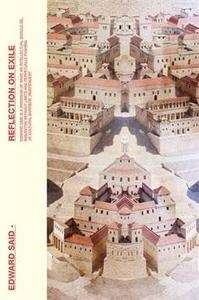Reflections On Exile

Editorial Granta Books
Fecha de edición agosto 2012
Idioma inglés
EAN 9781847085979
656 páginas
Libro
encuadernado en tapa blanda
Resumen del libro
With their powerful blend of political and aesthetic concerns, Edward W. Said's writings have transformed the field of literary studies. This long-awaited collection of literary and cultural essays, the first since Harvard University Press published The World, the Text, and the Critic in 1983, reconfirms what no one can doubt--that Said is the most impressive, consequential, and elegant critic of our time--and offers further evidence of how much the fully engaged critical mind can contribute to the reservoir of value, thought, and action essential to our lives and our culture.
As in the title essay, the widely admired "Reflections on Exile," the fact of his own exile and the fate of the Palestinians have given both form and the force of intimacy to the questions Said has pursued. Taken together, these essays--from the famous to those that will surprise even Said's most assiduous followers--afford rare insight into the formation of a critic and the development of an intellectual vocation. Said's topics are many and diverse, from the movie heroics of Tarzan to the machismo of Ernest Hemingway to the shades of difference that divide Alexandria and Cairo. He offers major reconsiderations of writers and artists such as George Orwell, Giambattista Vico, Georg Lukacs, R. P. Blackmur, E. M. Cioran, Naguib Mahfouz, Herman Melville, Joseph Conrad, Walter Lippman, Samuel Huntington, Antonio Gramsci, and Raymond Williams. Invigorating, edifying, acutely attentive to the vying pressures of personal and historical experience, his book is a source of immeasurable intellectual delight.
Biografía del autor
x{0026}lt;P x{0026}lt;B Edward W. Saidx{0026}lt;/B (1935-2003) fue uno de los intelectuales árabes más importantes del siglo XX. Nacido en Jerusalén en una familia palestina, se educó en el Victoria College de El Cairo, en el Mount Hermon School de Massachusetts y en las Universidades de Princeton y Harvard. Fue profesor de literatura inglesa de la Universidad de Columbia desde 1963 hasta su muerte. Además, en 1974 fue profesor visitante de literatura comparada en Harvard; en 1975-76, miembro del Center for Advanced Study in Behavioral Science de Stanford, y en 1979, profesor visitante de humanidades en la Universidad de John Hopkins. Fue director del Arab Studies Quarterly y miembro del Council on Foreign Relations de Nueva York, de la Academy of Literary Studies y del PEN. Entre múltiples premios recibió el Premio Bowdoin de la Universidad de Harvard y el Lionel Trilling Award en 1976, así como el Príncipe de Asturias en el año 2002.x{0026}lt;/P








